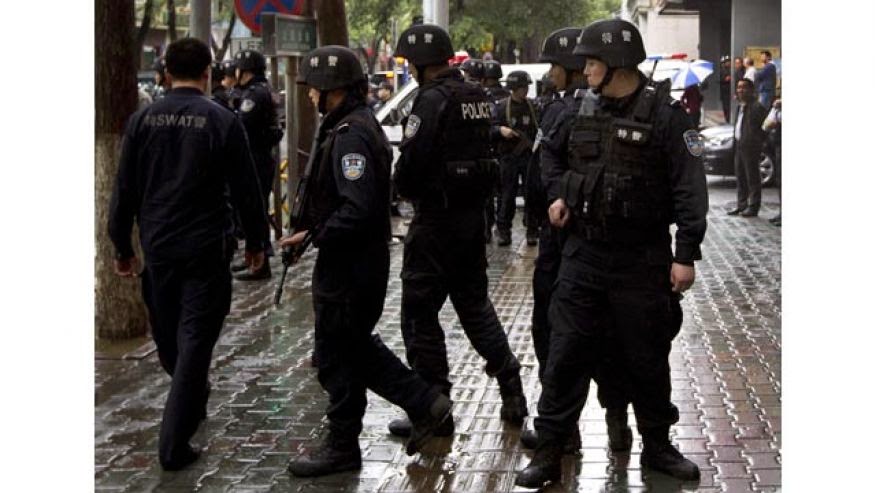 |
| A city in Xinjiang has banned the wearing of Islamic veils and dresses, along with long beards, over security concerns during a sporting event. After a backlash, the government explained the Islamic clothing were 'cumbersome' for sports. Photo: AFP |
A recent government ban on long beards and conservative #Muslim attire on public buses in a #Xinjiang city highlights China’s renewed – but counterproductive – effort to curb the spread of radical #Islam, scholars say.
The ban which took effect this week in Karamay, in the northern Xinjiang Uygur Autonomous Region, prohibited those wearing burqas, hijabs and niqabs, or clothes bearing Muslim symbols like the crescent moon and star from boarding buses.
The restriction will be enforced until August 20th, when a local sports event ends.
The authorities said ban was part of measures “to ensure safety on public transportation and combat terrorism”. It warned that “those who do not cooperate will be handled by police”, according to city’s official newspaper Karamay Daily.
The crescent moon and star is a symbol carried on the flag of the East Turkestan Islamic Movement, a separatist militant group accused by Beijing of advocating ethnic violence.
China blames it for a string of deadly terrorist attacks in Xinjiang and elsewhere in the mainland in the past few years.
Shan Wei, a National University of Singapore professor who studies the ethnic conflicts in Xinjiang, pointed out: “The banned apparel do not belong to traditional Chinese Uygur minorities’ customs.
“Instead the [clothing is] associated with the ‘extremists’,” Shan said.
Barry Sautman, a political science professor from the Hong Kong University of Science and Technology who specialises in ethnic politics on the mainland, said “a ban on religious symbols is counter-productive even where those symbols have been appropriated by ‘extremists’.
“Beards, veils, star and crescent symbols are associated with Islam … not just with Uygur nationalism [or] separatism,” Sautman said. “To think otherwise is like saying that the Star of David that appears on the Israeli flag stands only for Zionism, when in fact it is also a Jewish religious symbol.
Meanwhile, Burqas (an enveloping outer garment); the hijab (veil that covers the head and chest); and the niqab (which conceals much of the face except the eyes) are traditional attire for Muslim women.
“The [Karamay] restriction serves two purposes: one is to prevent potential terrorist attacks carried out on public transport, but more importantly, it contains the spread of radical Muslim ideology,” Shan said.
Uygurs, a large ethnic group in Xinjiang, have traditionally followed a moderate form of Islam, but in recent years have experienced a change following the rise of fundamentalist Islamic ideology in countries bordering Xinjiang, Pakistan and Afghanistan.
Observers said many local Uygur men and women in Xinjiang have been favouring the recognisable conservative Islamic attire (such as tunics and burqas) over their traditional costumes.
Xinjiang women’s traditional attire, for instance, are colourfully patterned dresses and squarish caps.
Shan said the ban showed Beijing’s determination to curb the radical Islamic influence using cultural means. “I can see some justifications behind the government’s approach, but the measure is too oversimplified and crude,” he said.
“Many Uygur minorities who wear the banned apparel do not have any radical political or extremist ideology,” he said.
In fact, since as early as a year ago, several Xinjiang local governments have banned burqas in the wake of a terrorist attack in the small northwestern county of Shanshan last June, leaving some 30 dead.
Businesses in a number of villages were ordered to stop producing and selling burqas while the official newspaper Xinjiang Daily carried a number of articles claimed wearing the Muslim dress was an “act against the Uygur tradition.”
China has over the years used “two-handed policies” – soft and hard – to deal with Xinjiang unrest. While the mainland government was convinced that raising the level of economic development in Xinjiang, specifically, improving Uygur households’ income and education levels, it is increasingly set on employing “hard policies”.
These include increased monitoring and beefing up the security apparatus, in the light of the string of terrorist attacks in the region, said Reza Hasmath, a University of Oxford lecturer in Chinese politics.
In the face of mounting opposition from Uygur residents and rising international condemnation, local officials have sought to downplay the association between conservative Muslim garb with terrorism.
Karamay officials on Thursday said they placed the ban partly because the clothing was cumbersome and “inharmonious with the athletic spirit” as the city prepares to host a regional sports event, the Global Times reported.;
In April, to stem the spread of extermist ideas, approximately 200,000 Communist Party cadres were ordered by the government to live in rural communities across Xinjiang, in what Hasmath called a grid “social management system”.
“The party members are assigned to each community zone and are tasked to monitor and conduct surveillance of various activities that are threatening, or potentially threatening”, said Hasmath.
He said the moderate option to deal with the spread of radical Uygurs lies in continuing to boost their employment and income levels.
Sautman also argued that increasing preferential policies for minorities and allowing them self-representation – not self-determination, or independence – in cultural and political spheres was the best path to douse ethnic tensions and curb radical Islamic thought.
“If Uygur minorities are in fact gaining ground in all spheres of activity, including relative to the Han population, the ‘solution’ offered by radical Islamists is much less appealing,” he said, referring to the Han Chinese majority in China. --SCMP















